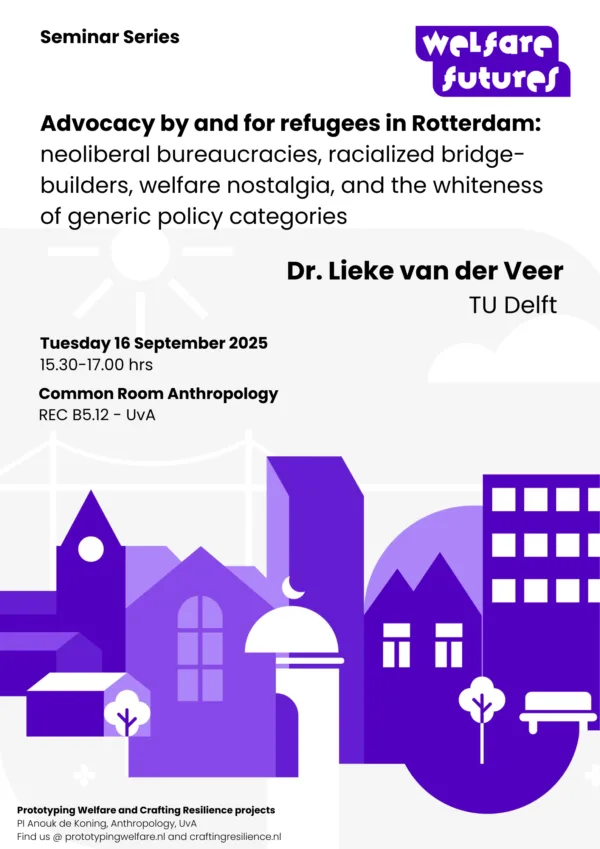'Advocacy by and for refugees in Rotterdam' door Lieke van der Veer
What
Lieke van der Veer, Advocacy by and for refugees in Rotterdam: neoliberal bureaucracies, racialized bridge-builders, welfare nostalgia, and the whiteness of generic policy categories.
When
16 September, 15.30-17.00, followed by drinks @ CREA Café.
If you are not able to join in person, you can also follow the talk and discussion via the live stream.
Where
REC B5.12, Common Room Anthropology (Roeterseiland, B-building, 5th floor).
During long-time fieldwork in Rotterdam, the Netherlands, Lieke has worked with non-white community organizers with a forced migration background who inhabit the institutional subjectivity of ‘bridge-builder.’ These bridge builders aspire to ‘give back’ by launching an ‘initiative’ to help others, with the assumption that this will enable them to step out of their precarious and liminal position of social indebtedness and enter into the realm of sociality and exchange. In doing so, they try to meet funding arrangements that are in line with the European trend of generic policy categories, and enter into collaborative government arrangements. To navigate these arrangements, they receive assistance from refugee advocates of long-term Dutch heritage who evoke narratives of nostalgia for a long-lost welfare state to motivate their commitment for social justice and for the inclusion of refugee-led initiatives. In this talk, Lieke addresses five concerns:
First, recipients of social benefits such as refugees in Europe are cast as socially indebted and therefore compelled to ‘give back.’ But in a landscape of outsourced service provision, superexploited labor, and subcontracting arrangements, the social debts that that refugees allegedly collected do not get redeemed.
Second, refugee-led organizations are caught by the paradox of having to nourish personalized relations in neighborhood-focused networks and enter into horizontal partnerships with bureaucrats—while top-down governance practices that require formalization and bureaucratization continue to put pressure on organizations. The effect of this paradox is that these organizations are faced not only with the impossible job to implement a degree of bureaucracy to show that they are non-bureaucratic, but also that they get to speak the language of capital—that in an extreme right-wing conjuncture becomes tangled up with anti-migrant hostility.
Third, the erasure of racialized and culturalized difference in policies that allegedly apply to all residents reconfigures a depoliticized white universalism in the Dutch welfare landscape and preserves the marginalization of specific groups.
Fourth, to legitimize their support activities, organizers and advisors rely on each other to build ‘relational authority.’ But power asymmetries surface as advisors have a gate keeper role while organizers hustle to settle in. Although the subjectivity of ‘bridge builder’ helps the organizers to stage their migration background as capital, the racialized dimensions of this form of authority-making prove resistant to being ‘undone’.
Fifth, fantasies of down-scaled local action cohere with uneasy postcolonial formations that surface in everyday interactions between advocates and organizers with a forced migration background. Whereas advocates are committed to down-scale refugee-led initiatives and weave together local networks of sociality, organizers seek to up-scale their initiative beyond the neighborhood and pursue social mobility. These controversies over scale echo social injustices that are bound up with post-war repair and decolonization.
Bio
Lieke van der Veer is a multidisciplinary scholar trained in Political Philosophy and Social Anthropology. Areas of expertise are: borders, refuge, participatory democracy, cultures of neoliberalism, state-citizen relations, social justice, and social movements.
Lieke's current research focuses on public policy in anti-discrimination, diversity, welfare, integration, and labor. She does so as a postdoctoral researcher in the project ‘Dilemmas of Doing Diversity.’ In this project she studies knowledge infrastructure, alliances with civil society organizations, and forms of administrative artistry in bureaucracies.
Lieke's doctoral thesis (2023) is entitled: ‘Care in a Frictional Field of Forces: Assistance and Advocacy by and for Recent Refugees in Rotterdam.’ Based on long-term ethnographic fieldwork, this thesis explores how refugee-led support initiatives are mediated by funding regimes, by advisors in refugee advocacy who perform as brokers, by citizenship ideals, and by bureaucratic practices of group-making.
Lieke held visiting positions at the University of Pittsburgh (2020), the University of Cambridge (2025), and the Max Planck Institute (2025). Previous academic employers include the Erasmus University Rotterdam (Public Administration and Sociology), the Radboud University Nijmegen (Cultural Anthropology and Development Studies), and the Amsterdam University of Applied Sciences (Philosophy).
Lieke’s work is published in journals including Journal of Ethnic and Racial Studies (2020), Journal of Borderland Studies (2021), Voluntas (2022), Urban Planning (2024), Social Analysis (in press), and Anthropological Theory (in press).
